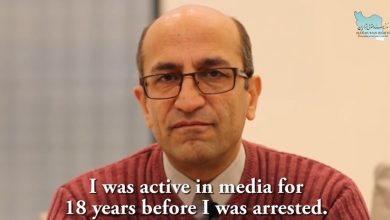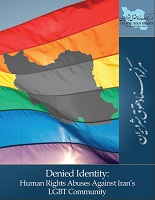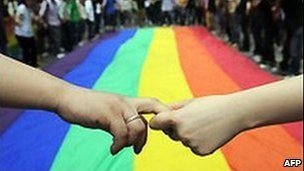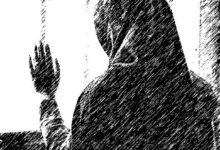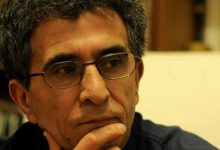Witness Statement of Radman
Name: Radman*
Place of Birth: Shiraz, Iran
Date of Birth: 1983
Occupation: Restaurant Manager
Interviewing Organization: Iran Human Rights Documentation Center (IHRDC)
Date of Interview: June 18, 2013
Interviewer: IHRDC Staff
This statement was prepared pursuant to an interview with Radman. It was approved by Radman on March 30, 2014. There are 43 paragraphs in the statement.
The views and opinions of the witness expressed herein do not necessarily reflect those of the Iran Human Rights Documentation Center.
* Pseudonym assigned to the witness.
Introduction
1. My name is Radman. I am gay. I was born in Shiraz in1983. My last job was running a pizza place. I left Iran in May 2007. I left Iran to avoid causing problems for myself, my partner and my family. We were put in a very bad situation because someone witnessed us engaging in homosexual relations in a parking lot. [The witness to our act] threatened and extorted us.
Background
2. It wasn’t until after I was with my first partner that I found out my sexual orientation with absolute certainty. Even when I had my partner I didn’t know I was gay. I just knew I was inclined towards my own sex, but of course I always felt that there were differences between myself and my brothers. For as long as I can remember I would do things which contrasted with what they did. We had very few similarities.
3. When I found out I was gay I think I was 17 or 18 years old. However, my family did not realize it at that time. They found out I was gay when I was supposed to be getting married.
4. My family decided that I should get married and I did oppose it a lot. The person they had in mind for me actually liked me personally. She was the sister of my brother’s wife. I put forth ridiculous conditions for marriage. For instance, I said that if I am to get married I won’t go to the bride’s family to ask for her hand, and that they should come to our home instead. They were in another city and actually ended up coming to ask me to marry their daughter! My family and her family would work around any condition I presented to them.
5. I was about 22 and I was about to get married. At the last moment, that is the night before the guests were going to come over and the marriage ceremony was to be conducted, I was forced to tell my sister the truth.
6. With the help of my brother’s wife, they resolved this issue with my mother and prevented the marriage from taking place. The girl never found out I was gay. As far as my family’s reaction goes, they didn’t react in any way that I could say bothered me. They didn’t seem to look at me in a negative way and even accepted me easily in a sense. But my father still didn’t know I was gay. If my father objected to the kind of stuff I did or the kinds of clothes I wore, my mother would respond that this is just how the youngsters dress these days. This way she brushed the issue aside and didn’t let my father bother me very much. But I’m perfectly aware that to this day my mother would have preferred me not to be gay. She prefers not to mention it. She might know for instance that I have a partner. And whenever there has been a partner in my life, if she wanted to ask about him, she would refer to him as my “friend.”
7. They did notice that for long durations of time I would be intensely attached to one of my friends, spending day and night with that person. I had my own stressful issues. For example, the arguments I had with my partners would affect me. My family would see the effect that they had on me, but they thought this was just friendship. They didn’t realize the other person was my partner and thought I was just attached to my friend and that this was a way of me socializing with friends. They didn’t realize that the person was my partner. They simply thought I was dependent on my friend and that we were causing too much trouble for each other so they kind of wanted to put a stop to this [by having me get married], because when you get married you have to be focused on family and stop fooling around with friends.
Living as a Homosexual in Iran
8. My experiences as a homosexual were both good and bad. No one knew I was gay, but if you paid attention, you would notice that my dispositions and my temperaments were different from others. I didn’t go to many social gatherings with my friends or family. That’s because my behavior was different, and not to say that people disapproved of them one hundred percent, but they didn’t fully approve either. They didn’t like it. There were pressures on you due to social and family circumstances, and you couldn’t be the way you wanted to be and live the way you wanted.
9. Our friendships were usually made from knowing people through the internet or finding a friend or two from other social gatherings. You’d go to parties with them and you’d find other homosexual people from that social group.
10. It was hard to find a friend who was like you and would understand you, i.e. a person like yourself, among all these people who you considered to be different like you. This in itself was a cause for depression. You would feel lonely, because it wasn’t easy to start relations with other people. Personally, I dealt with a lot of depression.
11. Also when we gathered around and found one another, you had all kinds of things to fear and tremble about. When you talked with someone in the streets, you were always afraid of people saying, “Why are you two talking to each other?” You’d be afraid of someone raiding parties and arresting people. These parties were different from the ones for straight people. If straight people were arrested, the situation would be very different for them than if we were to be arrested. This was the kind of discrimination we faced. These were the problems that existed. We didn’t have our personal freedoms.
12. I don’t know how it is now in Iran, but back then if people saw someone having good relations with people of his own sex, they wouldn’t label him as “gay” or “homosexual.” The other thing is that they wouldn’t label you by the clothes you were wearing as gay but they would call you “sissy.”
Harassment by the Authorities
13. As far as the government goes, specifically the conditions imposed by Islamic law, they would even find fault with what you were wearing in the streets. I had to be very cautious and I was very compliant. For instance while walking in the streets, they could ask you, “Why are you walking like this?”
14. This happened to me three or four times. They picked on the clothes I wore, even though my clothes weren’t flashy or flamboyant. I was detained for several hours.
15. One time, this occurred when I was on my way back from school. At school there was a dress code, e.g. shirts had to be long-sleeved without designer names on them. I was intransigent at the beginning, especially when I was in high school. The school Basij called me in several times, picked on me and pressured me by saying that they would expel me from school.[1] It was only because of the kinds of clothes I wore; otherwise I carried myself normally. They picked on me and informed my family. They caused a big headache.
16. After the school Basij picked on me several times, I had to change the way I dressed. But after leaving school, I had clothes in my backpack and I would change once I got out and before I headed home. One time the Guidance Patrol arrested me while I was waiting for the bus because I was wearing tight jeans and a short-sleeved T-shirt with a designer name on it.[2]
17. They were in uniforms. They took me to the neighborhood police station, inspected my bag a little and yelled, “What kind of clothes are these?” They warned me. There was a person sitting among them who was very well-dressed and I didn’t know he was an official. I said “Okay,” but he continued interrogating me. I said, “You’re picking on the way I dress. Who are you to interrogate me? Your clothes are worse than mine if you think about it.” A person standing there replied, “This gentleman is an official.” They would make you use your finger to stamp something as a pledge. You had to put your finger in ink and then on the sheet. But this person forcefully took my finger and stamped the sheet. He also slapped me two or three times and kept yelling.
18. Since I was rude to them, they made me wait. They called my family. My father came. They said to him, “This better be the last time we see him this way.” They made me pledge that this would not happen again, and then they released me.
19. This happened in several other places around Shiraz. They took me to the Guidance Patrol’s stations that every neighborhood has. The first time they took me and beat me it was at a police station near the Delgosha Garden located between the Garden and Saadi’s Shrine.
Therapy as a Homosexual in Iran
20. I personally went to therapy but you have to be very lucky to find someone who is able to understand the issue, or at least not use the term hamjensbaz instead of hamjensgara.[3] Doctors there have little knowledge and have read very little about the issue. I couldn’t expect much from them. That’s because there is nothing about homosexuality in psychology books they study because it’s all censored.
21. I talked to a psychiatrist. She was more informed about transsexuals than homosexuals. She viewed everything from the perspective of transsexuals. Based on the way I dressed and how I showed affection or showed interest in certain things, she’d say, “These are feminine inclinations so you’re a transsexual,” even though the inclinations of transsexuals are very different from those of homosexuals. In every discussion we had, she called me a transsexual. That’s because the phenomenon of homosexuality was not properly defined for [psychologists].
22. She wouldn’t directly encourage me to have sex-reassignment surgery but would say, “Your best option is to undergo a sex change, so that you’ll be able to have a better life. You’ll be yourself.” Instead of her psychoanalyzing me, I was the one psychoanalyzing her. Instead of her understanding me, I was the one trying to understand her and thinking, “Okay, she’s less informed and sees me as a transsexual.” I tried to listen to what she was saying and tried to help myself.
Exemption from Military Service
23. I told my therapist that my family is pressuring me to perform my military service. There isn’t much you can do without having completed the military service. This issue put a lot of pressure on me.
24. When I talked with my therapist regarding the pressure of military service, she said, “Since you’re a transsexual you’re able to get an exemption. You are not allowed to perform military service.” I received my military exemption for being a transsexual through my doctor.
25. I discussed this matter with my family and said, “I’ll pursue getting an exemption.” Prior to that, my father was going to pay a fee to have me exempted. But exactly at the moment when I was going to take action, they changed the requirements for exemption through making a payment. I no longer qualified, and they told me that I should serve. I discussed the issue of getting an exemption but I didn’t say how I would do it. My father didn’t believe that it was possible to actually get an exemption. He kept saying, “You should go to military service.”
26. I told my mother in so many ways what was happening and where my doctor stood on this issue. For this reason, my mother wanted to come and visit my doctor to find out which doctor I was seeing. She came to visit the doctor and they talked a little. In a sense that psychiatrist convinced my mother, saying “Let him go about getting an exemption. It’s to his benefit. It’s better than going to military service. It would be better to help him a bit.” From that point on, because of the tests I had formerly taken through my doctor, I was classified as LGBT and she considered me a transsexual. She wrote me a few letters for exemption, and I went about the process of obtaining it.
27. I had to apply for the military service booklet. I had to attach my doctor’s exemption letters to my file and send them to a specific address in Tehran. I sent them and received a response. Prior to that, they gave me a letter asking me to go to Iran Hospital in Shiraz, which belonged to the Military Service Organization. They wanted me to speak to a doctor there as well. He was a psychiatrist who worked for the Military Service Organization. He treated me a bit harshly. He took the same test from me all over again. The tests revealed the same results. The tests were like questionnaires. I think there were 300 to 400 questions in total, which I had to mark individually.
28. The test was multiple-choice. The questions asked, for instance, “What is your favorite color?” or “What would you do in this specific circumstance?” “Which of these two figures do you prefer and select?” Frankly, the tests weren’t easy. I remember bursting into tears when I was taking the test for the second time. I started crying because I didn’t understand why they were asking me all these questions and why I had to respond. Some of the questions dealt with my inclinations, which I had hidden for years. I did not want to reveal them, but now here I was responding to all these questions because they wanted to find out by force.
29. At any rate, I went to the Medical Commission and my file was on their table. They discussed my case a little and then called me into the room. There were four people and all four of them were men. Three of them came to an agreement about my exemption but one of them objected to my test results, and said he was going to send my file to Tehran for another medical examination. I already knew that examination would not be a pleasant one. They would want to take tests to see for example, how much sex I’ve had so far and things of that nature. For this reason, luckily for me, one of the doctors said, “This person’s case is completely obvious and we’d be sending him there for no reason.” They convinced the fourth person. He signed on, and I went to visit the head colonel in the other room.
30. They gave me an exemption as a transsexual but it wasn’t easy to obtain. When you go into those military environments, people look at you a certain way. For instance, people would see how you were carrying yourself, how you looked and how you dressed differently. They would look at you a certain way which put pressure on you and they would whisper things about you. At the end when I went to the colonel’s room to receive a final answer as to whether I was exempted or not, he first opened my file and started reading it. Then he asked me a few questions like, “Do you wear a bra? Do you do certain things? How do you have sex?” These were a little hard to answer.
31. I was afraid of responding to questions about sex. I had to answer but I didn’t know that if I said, “Yes, I did have this kind of sex,” it would be considered against Islamic law [and cause problems for me]. I wasn’t in “women’s clothes” yet and I had not had sex-reassignment surgery. When it came to sex, I said I never had sex. However, I lied to them about wearing a bra and told them I wore one when there was nobody else around in the house.
32. I lied to convince them that I was a transsexual because I knew that there was no exemption for homosexuals. That is to say even if you’re a homosexual and they know it too, the code used at the military service only applies to transsexuals.
33. At any rate, in the end, the colonel said, “The only reason you’re exempt is because you’re corrupt. You shouldn’t think you’re released and exempted for no reason. It’s because you people are corrupt and lead others astray, and that’s why you’re exempted from service.”
34. I was not worried that the type of my exemption and the code mentioned on my card would make it hard for me to get a job later. There were no other alternatives. I did go to high school but didn’t have a specific degree to find a specific administrative job, and for this reason I didn’t think about this matter at all.
35. I didn’t go into university after high school. When I went from the first year of high school to the second year of high school, we had to choose our field of study. I wanted to major in natural sciences but couldn’t because one of my grades fell short of the required minimum by 0.25 of a point.[4] They didn’t accept me. I remember at that time, they had recently introduced graphics as a major in the province of Fars, but it was considered to be a major for women. I wanted to go into graphics if it wasn’t possible for me to go into natural sciences, but relatives and acquaintances talked with my family and made them believe that this major was only suited for women and that it had no future, so they did not allow me to pursue it.
36. If you wanted to go to the technical school, there is a test you first have to take. I had never taken this kind of test before because I wasn’t allowed to go into graphics and sciences so I said I that I wouldn’t choose a major at all. One of my friends came to me once and said, “Radman, we must go register.” I said, “Register for what?” He said, “The technical school.” I said, “Well, we must take a test and I haven’t taken the test.” He said, “I saw your name on the board. Your name was listed there.” I don’t know if it was them who put my name in or if my family had something to do with it. At any rate they sent me to the technical school.
37. There was a lot of pressure on me at the technical school. The majors that were available there did not suit me at all. I first majored in turning and then in casting. I kept changing my major until I realized that I wasn’t getting any results. This went on until the system changed and we were incorporated into the new educational system. The new system was the annual credit system and there was a shortage of space, so they asked us to leave the school and attend night school. They sent us back to high school from the technical school. This time I said I might be able to major in what I wanted at the night school, but they did not let me. They said, “You’ve come to high school from the technical school, and you must study things like technical drawing or construction or industry.” This went on until I reached the age for military service, and they said, “You must leave school and stop your education.” All avenues for my pursuit of education were closed, and I had lost interest in school by then. . Even after I received my military exemption, I did not continue school.
Leaving Iran
38. I decided to leave Iran because of a very bad situation that arose for me and for my partner. I had to leave Iran so as not to create more trouble for him, myself or my family.
39. When you have someone who witnesses you in the act of sexual intercourse, particularly when it comes to homosexuality and so forth, you can be sentenced to death. I had someone who had witnessed something that took place in a parking lot. He was an Imam at the neighborhood mosque and he was also one of our neighbors. He was causing a lot of trouble because he had threatened us several times.
40. When he saw us and started shouting and making threats, we were in the parking lot and fortunately nobody was around. We tried to please him so that he wouldn’t tell anyone and said that we would do anything or give him anything. He asked for money.
41. He was not a cleric per se. I remember when we would see him in the mosque he would wear one of those clerical robes but he didn’t have a clerical robe or turban outside of the mosque. First we paid him a little over a million tomans.[5] But he asked for more and I couldn’t use my father’s checkbook to give him more. We paid in cash. We saw that if this was to continue, we would have no way of continually coming up with money for him and even if we did, he would surely keep asking for more every time. He asked for three million and we arranged about 1.2 million of it. He said “This will do for now.” The words “for now” meant that this was going to persist for some time. We came up with the money that same night so that he would trust us and give us more time to come up with the rest of the money. We had to come up with the money, but we realized it wasn’t possible.
42. I don’t know his name but people called him Haj Kouhi. They referred to him as Haj Kouhi, but I don’t know whether “Kouhi” was his title or his last name. I just always remember him being referred to as “Haj Kouhi.” I don’t know whether he put pressure on my partner again for more money. I had no contact with him after that. The conditions were such that I was just able to get my documents together, pick up some clothes and purchase a ticket.
43. I left Iran by myself. Ultimately, I left two or three days after the incident. I think it was May of 2007. I left legally because I had a passport.
[1] Basij is a volunteer militia force, and during the Iran-Iraq war it fought under the direction of the Islamic Revolutionary Guard Corps (IRGC). Basij played a significant role in suppressing the post-June 2009 election protests. Basij forces also may set up checkpoints on the streets or go to residential units to enforce the IRI’s morality code.
[2] Guidance Patrol is a unit of the police force and it enforces Iran’s strict dress code and morality norms.
[3] The term hamjensbaz, as opposed to hamjensgara, does not imply that the person involved in a homosexual relation is innately gay.

